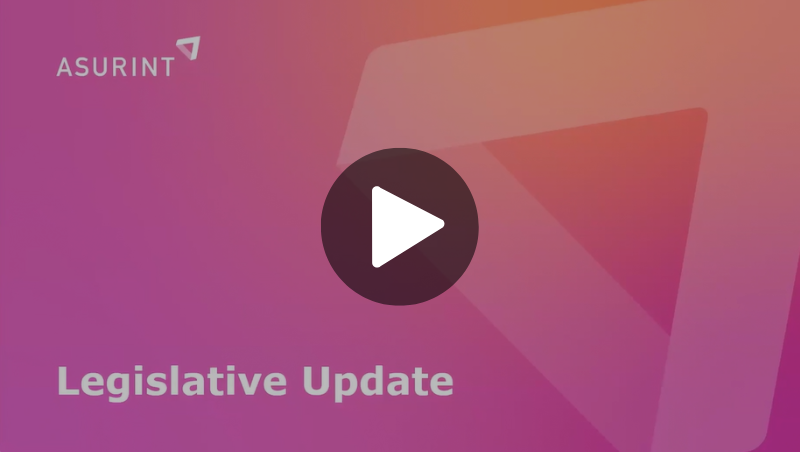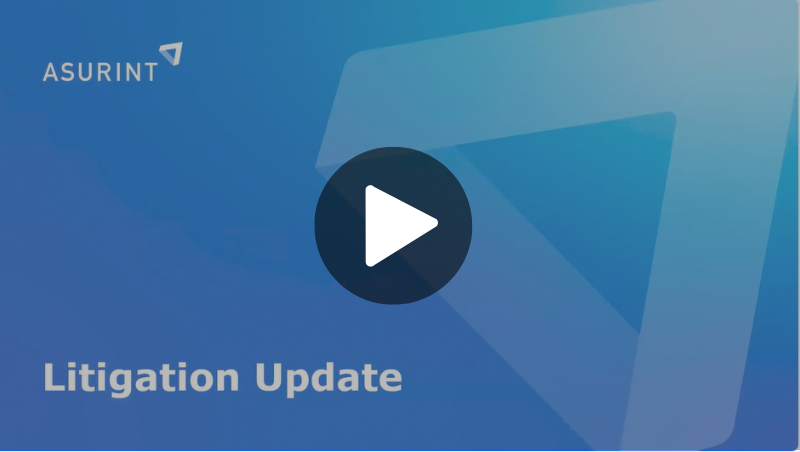Is it possible to keep up with rapidly emerging compliance impacts on hiring and employment? It certainly can be a struggle! But once again, Asurint’s compliance team is here to help.
We recently held our latest edition of the Keeping Up with Compliance webinar, a regular feature in our long-running webinar series. Kelly Uebel, Asurint’s General Counsel, did a great job reviewing legislative, regulatory, and litigation issues employers should be aware of.
Didn’t have time to attend? No problem, you can stream it here or read on for the highlights.

The Legislative Lowdown
First up, an alert about criminal background checks. A Maryland law limiting the criminal conviction lookback to seven years will go into effect October 1, 2024. The new law lowers the salary threshold for an exception to apply, so if you operate in or hire out of Maryland, keep this in mind.

Activity around so-called “clean slate” laws has also heated up, so much so we are drafting a new guide on the topic to help employers navigate the issue jurisdiction by jurisdiction. Mark your calendars for this guide to go-live in September 2024.
Here are some of the latest happenings we’ve collected:
- Delaware’s clean slate law went into effect August 1 and allows for monthly expungement of eligible records. In play are primarily misdemeanors, low-level drug offenses, and a limited number of felony charges.
- California’s law also went into effect over the summer, this one on July 1, although it remains unclear how the state will manage automated monthly expungement.
- North Carolina revamped prior legislation allowing for the automatic expungement of charges that were brought but then ultimately dismissed, or the person was otherwise found not guilty or responsible.
Clean slate momentum appears to be building across the country, so we will continue to monitor the topic. Check back with the Asurint blog and Keeping Up with Compliance webinars to get the latest.
Matters Before the Courts
The plaintiff’s bar is still leveraging the Fair Credit Reporting Act to take employers to court. A recent $1.87 million settlement, for example, was reached in a case where a key complaint was that the disclosure form was not in all caps and bold face, the dislcosure was part of an employment application and that it included multi-state law differences. While the employer did not admit liability or wrongdoing, it’s important to have your disclosure and authorization forms reviewed by qualified legal counsel on a regular basis!

Adverse action has also been a focus of litigation. Complaints have targeted improper use of an adjudication matrix or scoring mechanism, along with timing or sequence of pre-adverse action letters and other communications. The common theme seems to be whether candidates have a real ability to dispute or discuss the contents of a background report in a manner that could ultimately affect the hiring decision – or whether the true adverse decision was made by the employer upon application of the initial score before a pre-adverse action letter was sent out.
One of the cases Kelly discussed resulted in a $2.25 million settlement. The plaintiff claimed to have received two automated emails from the employer on the same day the background report was completed, one of which rejected his employment application. A pre-adverse action letter was received later, but the plaintiff argued that the automated rejection email revoking the offer of employment had denied his right to review and correct any issues that arose on the background report. Timing matters, or at least it did in this situation.
Kelly reviewed a number of other adverse action cases, so stream the full webinar if this is an area of concern for you. It’s also a good time to consult with qualified legal counsel to review your adjudication matrices, scoring verbiage, and pre-adverse and adverse action communications.
More About Marijuana
It wouldn’t be a Keeping Up with Compliance summary without a section about marijuana and drug testing. Let’s see what’s been going on.

Perhaps the highest profile action is at the federal level with a potential rule change in the works, which would move marijuana from a Schedule I to a Schedule III drug. The process could take many months and should remain on employers’ watchlists.
Also happening at the federal level are things like the Marijuana Misdemeanor Expungement Act, which would create a mechanism for expunging records related to non-felony offenses. This bill, like most federal efforts on the criminal front, appears unlikely to pass both chambers of Congress, however. Even with high-profile support from the likes of Senate Majority Leader Chuck Schumer, gridlock on cannabis seems to be the order of the day.
Which leads us to state-level initiatives. Ohio has issued provisional licenses to well over 100 dispensaries. Ohio has taken a more employer-friendly approach however and does not require marijuana use accommodation. Employers in Ohio may continue to prohibit use or possession of marijuana, so you can keep your Drug Free Workplace as it is (as always, we recommend having your policies reviewed by qualified legal counsel).
In other areas, the legalization train has slowed. Pennsylvania seemed poised to allow recreational cannabis use, as did New Hampshire, but neither were successful. A North Carolina bill permitting medical marijuana use also looks like it will die.
Pardons and expungement have been more prevalent, on the other hand. Maryland’s Governor for instance, pardoned approximately 175,000 cannabis-related misdemeanor offenses. Minnesota, in contrast, expunged nearly 58,000 records after recreational marijuana was legalized. Note that expungement is different than a pardon in many jurisdictions, so if you have questions or need clarification about how offenses may or may not appear on a background check, please reach out!
Some states, such as Alaska and Minnesota, are taking action on oral fluid testing for drugs and alcohol, as well as written notice requirements regarding test results. We may sound like the proverbial broken record, but the jurisdiction-by-jurisdiction variety and rapidly changing landscape should make a check-in with legal counsel a priority. Make sure you’re using only allowed forms of testing, following required procedures, and documenting and communicating as prescribed by law.
Of course, the rules of the cannabis road continue to be tested in the courts, and Kelly provided some perspective on two recent cases and what they may mean for employers. Details matter in terms of precedent, so check out the full recording to understand how these lawsuits unfolded.
Need More Compliance Resources? Asurint Has Your Back
Keeping up with compliance will always be a challenge. But with webinars like this one, as well as our blog and numerous guides like our:
Asurint will continue to help you monitor change so you can have fruitful conversations with your legal counsel. Stay tuned!